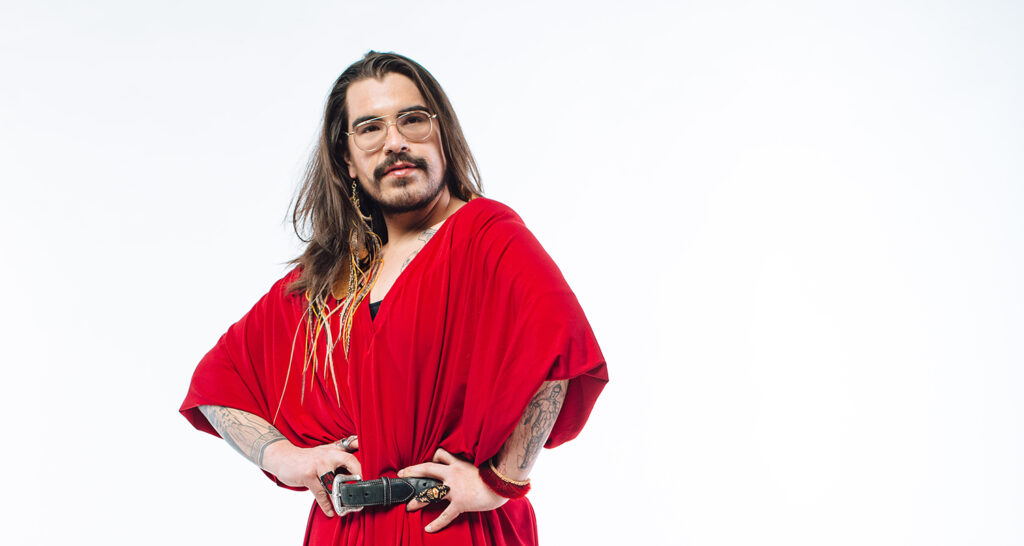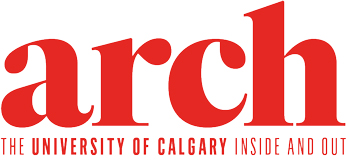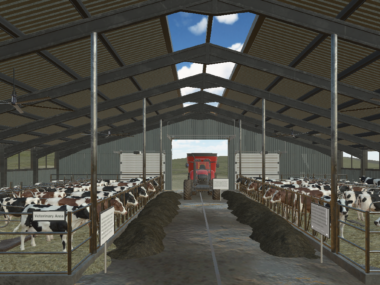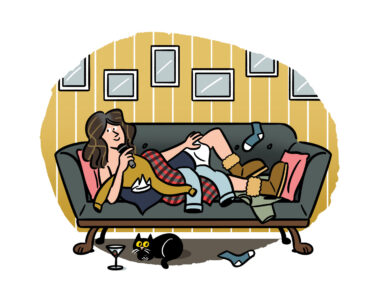
Written by Jacquie Moore, BA’97
Nobody talks about Dover like Joshua Whitehead talks about Dover. The southeast Calgary neighbourhood, bounded to the south by Peigan Trail and overshadowed by Forest Lawn to the north, flies low on Calgary’s real-estate radar. Seen through the lens of one of Canada’s most inventive young artists, however, Dover is a heartland of stunning river views, bucolic swimming holes and unconventional vibes that both inspire and ground his work.
Indeed, Whitehead, who is poised to complete a doctorate in English from the University of Calgary this summer, has a gift for seeing and articulating beauty and meaning in unexpected places. A two-spirit, Oji-Cree/nehiyaw member of Peguis First Nation in Manitoba, he is the author of the novel, Jonny Appleseed (Arsenal Pulp Press, 2018), which was longlisted for the Scotiabank Giller Prize and recently won CBC’s 2021 Canada Reads. The book’s lovable protagonist, Jonny, is an Indigenous sex worker who is as unforgettable as the rez he leaves behind. “It’s… home because the bannock is still browning in the oven and your kokum is still making tea and eating Arrowroot biscuits,” writes Whitehead. “It’s home because it has to be — routine satiates these pangs.”
At 32, Whitehead, who is as unassuming as he is original, has racked up more accolades than successful writers twice his age: in addition to the above, he won the Governor General’s History Award for the Indigenous Arts and Stories Challenge in 2016 and, in 2018, his debut poetry collection, full-metal indigiqueer (Talonbooks, 2017), was a finalist at the Indigenous Voices Awards.
Now, a version of the dissertation behind his PhD in Indigenous literatures and cultures is poised to grace literary festivals and nightstands everywhere. In addition to a book deal with Penguin Random House for two novels, Whitehead signed with Knopf Canada for a creative work of non-fiction excerpted from his academic topic and titled Making Love with the Land. As Whitehead describes it, the book will be a reflection on his personal experiences with the land in Manitoba and Alberta, “as spaces ripe with knowledge for approaching mental health and queerness from an Indigenous perspective.”
If Whitehead doesn’t wake every day feeling like “one to watch,” he’s not unaware that his life is observed from afar by legions of young people, in particular Indigenous young people, for whom he thinks of himself as “a gate-opener.” Whitehead believes “things are shifting in queerness overall in Western society, and also normalizing within Indigenous cultures.” Via his storytelling and uninhibited social media presence, he imagines “holding hands with everyone as we move forward.”
In the long term, Whitehead hopes to find an academic post teaching creative writing and Indigenous literature. Meanwhile, he’ll keep writing and “enriching two-spirit stories over my lifetime.”
Wherever he lands, he vows to keep returning to the places he loves in the Blackfoot territory: Áísínai’pi (Writing-on-Stone), Head-Smashed-In Buffalo Jump — and the Dover hills.



